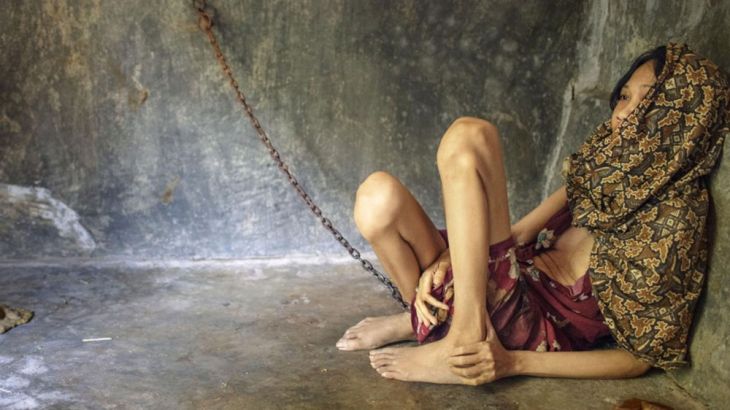Mentally-ill Indonesians locked up and shackled
Despite decades-old ban of practice, about 18,800 patients are still in chains or dirty sheds, Human Rights Watch says.

People with psychosocial disabilities in Indonesia are often chained or forced into institutions where they face abuse, according to Human Rights Watch.
The US-based rights group’s report, released on Monday, revealed that 57,000 people in Indonesia with mental health conditions have been subjected to “pasung” (shackled and often locked up in a confined space) at least once in their lives.
Keep reading
list of 4 itemsIn India’s richest state, exam scams kill escape from farm crisis
Displaced 12-year-old boy becomes Gaza’s youngest medic
Why are so many young Americans suffering from mental distress?
We don’t want any more shackling but we are working to find a way local communities can deal with mentally ill patients who are living too far from mental health clinics.
People subjected to pasung have their ankles bound with shackles, rope or wooden stocks and are locked in confined spaces where they eat, sleep, urinate, and defecate.
A ban on shackling in Indonesia has been in place since 1977, but Human Rights Watch says about 18,800 are currently subject to the treatment across the country.
“Shackling people with mental health conditions is illegal in Indonesia, yet it remains a widespread and brutal practice,” said Kriti Sharma, disability rights researcher at Human Rights Watch and author of the report.
One of those locked up is Pupun, who has been confined for five months in a cage, where he lives in his own excrement. His family is sometimes afraid to even feed him.
After he murdered his mother and mutilated her body, he was taken to a mental hospital, but four months later he was locked up again.
“They said he was cured. But after three months, he became aggressive again. He injured the head of a villager with a machete. His friend and I were also wounded. I am worried [about what would happen] if we let him out,” Papun’s uncle Dimyati told Al Jazeera.
Owing to a lack of knowledge or money to seek medical care, many families see no other solution than to lock up the mentally ill.
Superstitious beliefs
“They often have superstitious beliefs, of a curse, or that someone is possessed by evil spirits and therefore their only resort in their mind is chains,” said Shantha Rau Barriga, the director of the disability rights programme at Human Rights Watch.
Indonesia struggles with a shortage of psychiatrists; only 800 reportedly practise in Indonesia, a nation with a population of 250 million people.
Government data suggests the 2015 expenditure on health was 1.5 percent of the total budget and 90 percent of those who may want access to mental health services cannot owing to a lack of services.
The government, however, aims to have universal health coverage, including mental healthcare, in place by 2019.
|
|
“We don’t want any more shackling but we are working to find a way local communities can deal with mentally ill patients who are living too far from mental health clinics,” said Dr Fidiansyah, the Ministry of Health’s Director of Prevention and Control for Mental Problems and Illegal Drugs.
“We need to educate communities to take care of them in a more humane way.”
The report calls on the Indonesian government to put an end to pasung and make mental health a priority.
Other recommendations include the amendment of the 2014 Mental Health Act to ensure that people with psychosocial disabilities have the same rights as other Indonesians.
“When I was locked up in the shed it was very dark,” Agus bin Yunus, a 26-year-old who was forced to live inside a henhouse, told Al Jazeera.
“There was a bad smell and at night I could see animals coming. I was very scared.”